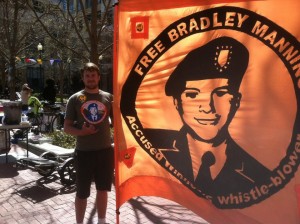Update 4/30/12: Some media coverage of Bradley Manning’s Article 39 hearing
Excessive secrecy, disastrous implications, and utter immorality
 Last week, Ft. Meade held PFC Bradley Manning’s most recent Article 39 pretrial hearing, and the Bradley’s supporters held protests in and outside of the courtroom and around the world. Click here for detailed courtroom notes for April 24, April 25, and April 26, and here for a recap of demonstrations.
Last week, Ft. Meade held PFC Bradley Manning’s most recent Article 39 pretrial hearing, and the Bradley’s supporters held protests in and outside of the courtroom and around the world. Click here for detailed courtroom notes for April 24, April 25, and April 26, and here for a recap of demonstrations.
On MSNBC, the Support Network’s David House spoke with Dylan Ratigan about the government’s aggressive effort to send Bradley to prison for life without a fair trial, precluding discussion of alleged damage harmed, and keeping even the pretrial hearings extremely secretive:
Among the first rulings was military judge Col. Denise Lind’s rejection of the Center for Constitutional Rights’ renewed call for transparency in Bradley’s legal proceedings. In response, many legal and political writers condemned the military’s continued secrecy. Below is a small sampling of the many stories covering Bradley’s case to emerge last week.
In “Shedding Light on the Secret Pre-Trial of Bradley Manning,” Mike Ludwig writes for Truthout:
The government has so far refused to provide key pieces of evidence against him to his defense team, a process known as discovery. Several pre-trial meetings between prosecutors and Manning’s defense were also held behind closed doors and out of public light. Court orders and motions are currently held secret despite complaints lodged by the Reporters Committee for Freedom of the Press and the Center for Constitutional Rights (CCR) on behalf of Assange.
CCR attorney Shane Kadidal told Truthout that he was surprised by the lack of media presence at the hearings. Kadidal said that if it was in the government’s interest to diminish media attention, then cutting off the flow of interesting information – such as court documents – is more effective than a complete blackout, which would pique reporters’ interest.
Expounding on the legality of military secrecy, Seton Hall Law professor Jonathan Hafetz writes for Huffington Post:
The law is clear: U.S. Supreme Court decisions establishing a First Amendment right of public access to criminal proceedings extend to courts-martials. So does the federal common law right of public access, a critical element of the United States’ long tradition of open courts. And, just for good measure, the military’s own rules mandate a presumption of open, public trials.
…
“Democracies die behind closed doors,” cautioned federal appeals court judge Damon Keith amid the fear that gripped the nation after the 9/11 attacks.
The more important the trial, the more pressing that it be open, and that the public be able to witness proceedings (whether directly or via the press) and view documents so that it can understand the issues.
Judge Lind also rejected the defense’s motions to dismiss the “aiding the enemy” charge and to dismiss the government’s unreasonable multiplication of charges. On the “Government’s Overreach on Bradley Manning,” the ACLU’s Ben Wizner writes that the “implications of the government’s argument are breathtaking.” Furthermore:
The crux of the government’s case against Manning — that he leaked sensitive documents without authorization — in no way depends on branding him a traitor. Indeed, some courts have held that leaks may be punished even if the leaker’s motive was purely patriotic. In its zeal to throw the book at Manning, the government has so overreached that its “success” would turn thousands of loyal soldiers into criminals.
Finally, John Glaser reminds us that Bradley shouldn’t be on trial in the first place, in “The Moral Mockery of the Trial of Bradley Manning,” for Antiwar.com:
From what I can tell, the pre-trial hearing of Bradley Manning is a moral mockery that will be looked upon with shame by future generations.
…
That these proceedings can advance without everybody involved constantly asking themselves why Manning is being tried as opposed to the war criminals he allegedly exposed through his leaks says everything there is to say about the trial, I think.
Check our Updates section throughout the week for more detailed accounts of international demonstrations. Bradley returns to Ft. Meade June 6. We’ll be there — join us!









